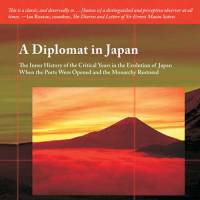The "Great Man" theory of history has largely been discredited. Propounded by Thomas Carlyle in the 1840s, it suggests that history is moved and swayed by the personalities of "great men" such as Alexander the Great and Napoleon. While there are clearly examples throughout history of men and women who were "great," societal trends and technological advancements are now considered far more important drivers of history.
A Diplomat in Japan, by Sir Ernest Satow.
424 pages
STONE BRIDGE PRESS, Nonfiction.
But personalities should never be removed from history completely. The right person in the right place at the right time can make a difference. The story of Japan's "modernization" at the end of the Edo Period (1603-1868) and the beginning of the Meiji Era (1868-1912) is packed with many such characters.
Ernest Satow was one. Initially a student interpreter, he arrived in Japan in 1862 and worked his way through the ranks of the British Legation in Tokyo before departing in 1883. This book covers his initial seven years and is both a remarkable historical document and a rollicking good read. Armed with dry wit and a decidedly un-Victorian attitude toward drinking and having fun, Satow is the perfect guide to the social life, political conflict and cultural exchanges that marked one of the liveliest periods in Japanese history.
He was an eyewitness to many of the events that shaped modern Japan as well as a key player — there is no better story through which to bring to life the turmoil and exhilaration of this revolutionary moment.
Read archived reviews of Japanese classics at jtimes.jp/essential.


















With your current subscription plan you can comment on stories. However, before writing your first comment, please create a display name in the Profile section of your subscriber account page.